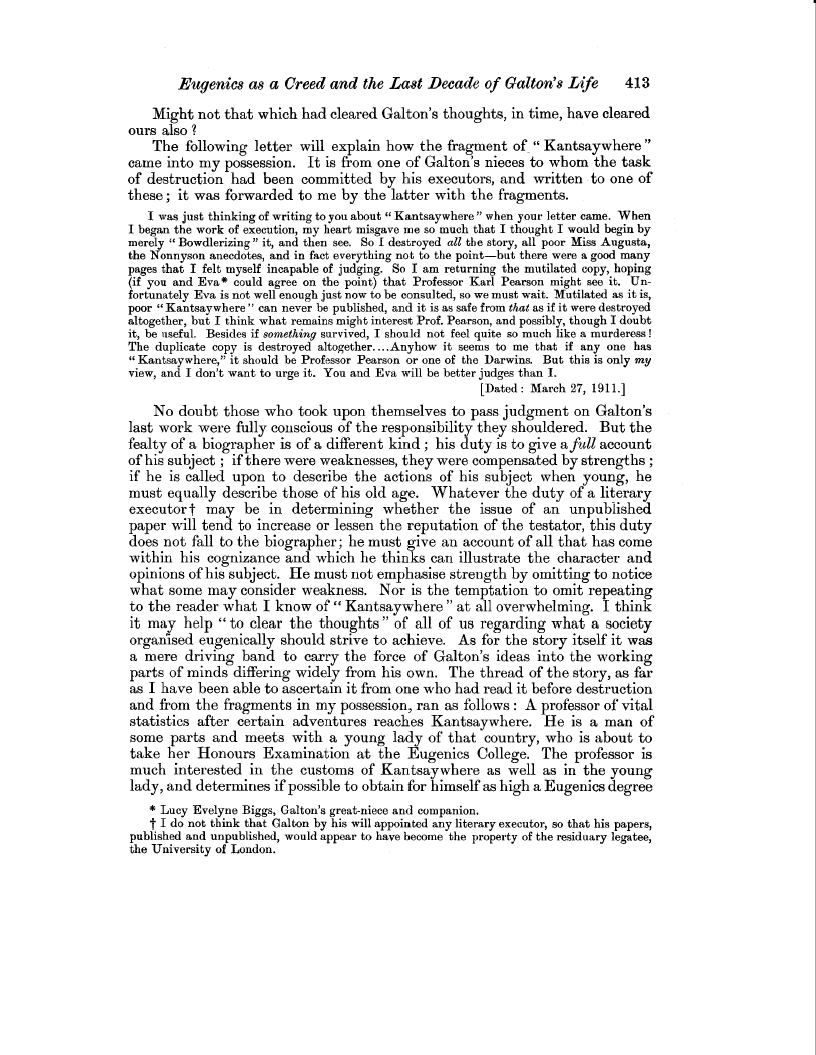| ||||||

OCR Rendition - approximate
Eugenics as a Creed and the Last Decade of Galton's Life 41.3 Might not that which had cleared Galton's thoughts, in time, have cleared ours also ? The following letter will explain how the fragment of_ " Kantsaywhere " came into my possession. It is from one of Galton's nieces to whom the task of destruction had been committed by his executors, and written to one of these ; it was forwarded to me by the latter with the fragments. I was just thinking of writing to you about "Kantsaywhere" when your letter came. When I began the work of execution, my heart misgave me so much that I thought I would begin by merely "Bowdlerizing" it, and then see. So I destroyed all the story, all poor Miss Augusta, the Nonnyson anecdotes, and in fact everything not to the point-but there were a good many pages that I felt myself incapable of judging. So I am returning the mutilated copy, hoping (if you and Eva* could agree on the point) that Professor Karl Pearson might see it. Unfortunately Eva is not well enough just now to be consulted, so we must wait. Mutilated as it is, poor '°Kantsaywhere " can never be published, and it is as safe from that as if it were destroyed altogether, but I think what remains might interest Prof. Pearson, and possibly, though I doubt it, be useful. Besides if something survived, I should not feel quite so much like a murderess The duplicate copy is destroyed altogether.... Anyhow it seems to me that if any one has "Kantsaywhere," it should be Professor Pearson or one of the Darwins. But this is only my view, and I don't want to urge it. You and Eva will be better judges than I. [Dated : March 27, 1911.] No doubt those who took upon themselves to pass judgment on Galton's last work were fully conscious of the responsibility they shouldered. But the fealty of a biographer is of a different kind ; his duty is to give a full account of his subject ; if there were weaknesses, they were compensated by strengths ; if he is called upon to describe the actions of his subject when young, he must equally describe those of his old age. Whatever the duty of a literary executor-{- may be in determining whether the issue of an unpublished paper will tend to increase or lessen the reputation of the testator, this duty does not fall to the biographer; he must give an account of all that has come within his cognizance and which lie thinks can illustrate the character and opinions of his subject. He must not emphasise strength by omitting to notice what some may consider weakness. Nor is the temptation to omit repeating to the reader what I know of " Kantsaywhere " at all overwhelming. I think it may help " to clear the thoughts " of all of us regarding what a society organised eugenically should strive to achieve. As for the story itself it was a mere driving band to carry the force of Galton's ideas into the working parts of minds differing widely from his own. The thread of the story, as far as I have been able to ascertain it from one who had read it before destruction and from the fragments in my possession, ran as follows : A professor of vital statistics after certain adventures reaches Kantsaywhere. He is a man of some parts and meets with a young lady of that country, who is about to take her Honours Examination at the Eugenics College. The professor is much interested in the customs of Kantsaywhere as well as in the young lady, and determines if possible to obtain for himself as high a Eugenics degree * Lucy Evelyne Biggs, Galton's great-niece and companion. j' I do not think that Calton by his will appointed any literary executor, so that his papers, published and unpublished, would appear to have become the property of the residuary legatee, the University of London.
|